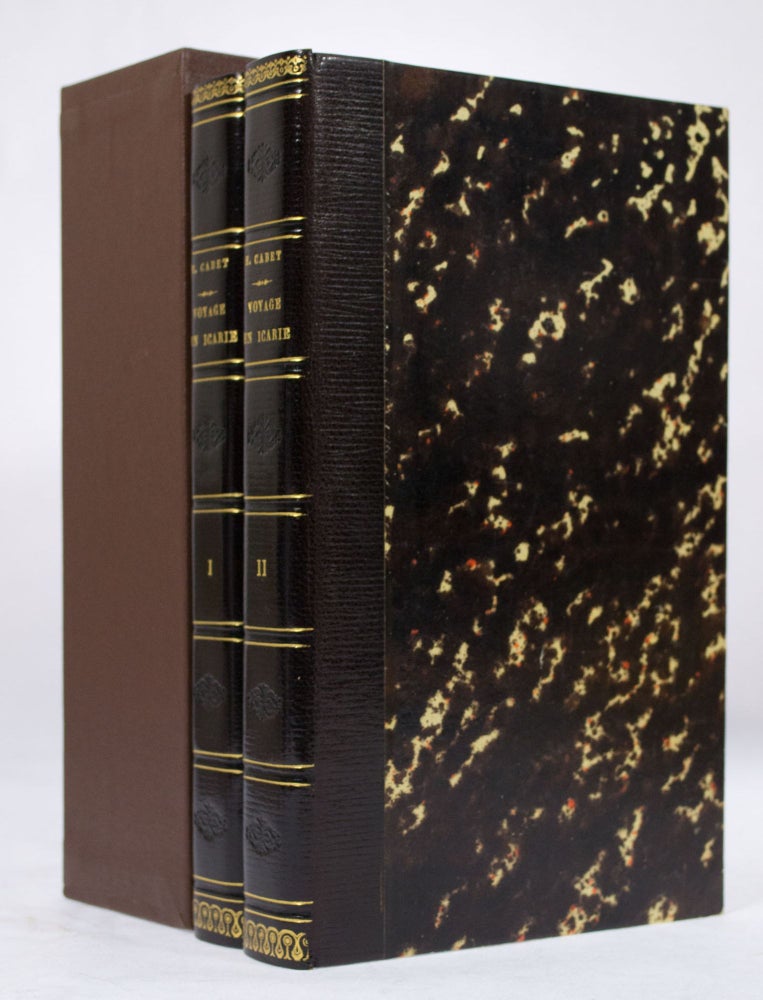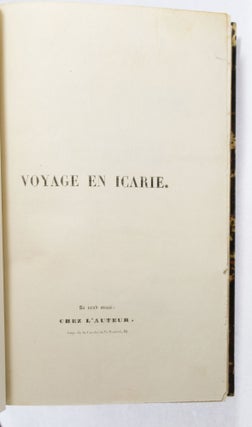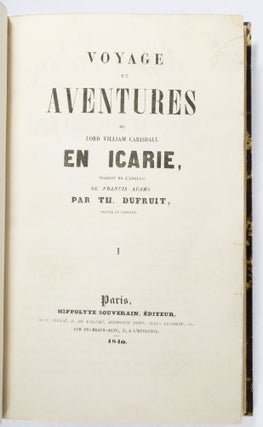Voyage et Aventures de Lord Villiam Carisdall en Icarie. Traduits de l'Anglais de Francis Adams par Th. Dufruit.
Paris: Hippolyte Souverain, 1839.
First edition, Published in a Very Limited Number of Copies for Distribution Among Friends
[CABET, Etienne]. Voyage et Aventures de Lord Villiam Carisdall en Icarie. Traduits de l'Anglais de Francis Adams par Th. Dufruit. Paris: Hippolyte Souverain, 1840 [1839].
First edition, published in 1839 in a very limited number of copies for distribution among friends only. In 1840 the work appeared under its generally known title, Voyage en Icarie, with the name of the author on the title. Two volumes. [4], 402 (misnumbered 378); [4], 510 pp. On both titles the name William has been misprinted Villiam.
Modern half morocco, marbled sides, gilt lettering to spine by Lobstein-Laurenchet. Repair to the 'Table des Chapitres' of Volume I, without loss of text.
Etienne Cabet (1788-1856), French communist and social reformer. Cabet was educated as a lawyer, became a director of the Carbonari and devoted himself to democratic propaganda. Because of his inflammatory denunciations against the government Cabet was exiled; he lived in England for five years, where he came under the influence of Robert Owen, and returned to France a convert to communism. He expounded his theories in the famous Voyage en Icarie, a description of a utopia in which the government is the family, which remains under the leadership of the head of the family. Ardent disciples rallied about Cabet and raised subscriptions to finance a vanguard which sailed for Texas in 1848 to establish an Icarian city after Cabet's model. The land which Cabet had bought, and of the location of which he had only a vague idea, was located in the middle of the wilderness, in Fanin, Texas. After suffering many perils and privations the explorers beat a retreat to New Orleans. Cabet joined his disciples the next year, bringing with him new converts, and the Icarian city was created at Nauvoo, an old Mormon town in Illinois. At first the colony prospered but disagreements developed and in 1856 the founder and two hundred of his followers abandoned the settlement. After Cabet's death the colony moved to Cheltenham, Iowa, and later to Corning, continuing to follow in large measure Cabet's ideas. As late as 1881 a Cabetian colony was founded at Cloverdale, California. "It is in fact little realized today that if France is the 'classic land of socialism' the United States contests with Russia the claim to be considered the classic land of communism. The story of the communists in America, where they were then known as Primitive Christians, is perhaps one of the most incredible in the history of Utopias" (D. Owen Evans, Social Romanticism in France, 1830-1848, pp. 56-58). Cabet's importance lies in his attempt to institute, or at least to further the establishment of, a completely communistic society, in which the supreme control of all essential activities was to be in the hands of the State. "The deepest influences on his social doctrine were those of Thomas More and of Robert Owen—the Owen of the years after 1832, when the leaders of the Grand National Consolidated Trades Union were anticipating the immediate advent of the New Moral World, to be achieved, not be violent revolution, but by the refusal of the entire working class to continue labouring under the old conditions, and by the joining together of all trades to set on foot a new system of co-operative production and distribution under their collective control. Cabet's Communism went a great deal further than Owenism towards complete community of living: he blended Owenite millennialism with communistic aspirations drawn from the record of primitive Christianity and of the social radicalism of the Middle Ages and the Catholic Renaissance" (G.D.H. Cole, A History of Socialist Thought, I, Chapter VII).
Goldsmiths' 31818. Monaghan, French Travellers in the United States, 313. Prudhommeaux, Icarie et son Fondateur Etienne Cabet, 35. Sabin 9788. Not in Kress; not in Einaud; not in Howes.
HBS 66527.
$10,000.
Price: $10,000.00
Item #66527



